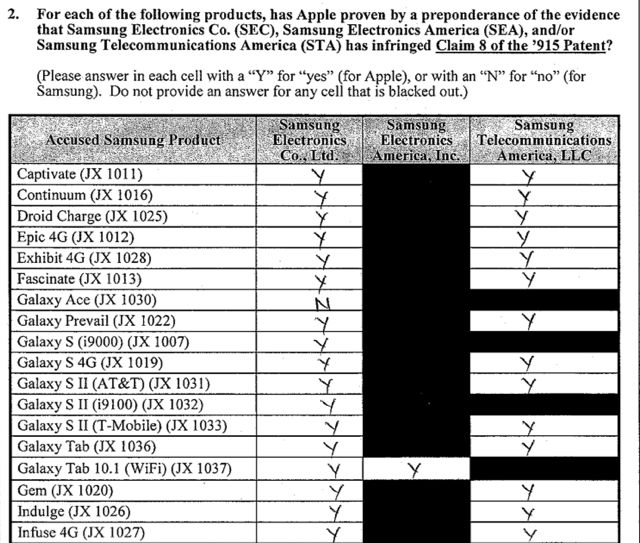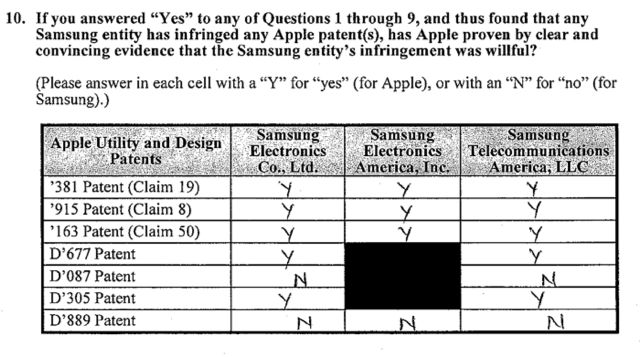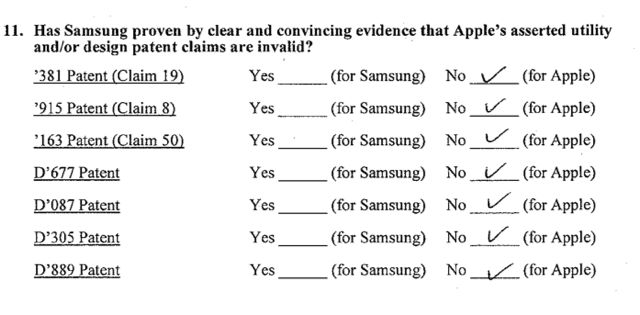Samsung has filed with the court a copy of the recent decision by the USPTO that Apple's '915 patent, the pinch to zoom patent used against Samsung, is
invalidated, all its claims, 1-21, in a preliminary ruling:
2202 -
Filed & Entered: 12/19/2012
STATEMENT OF RECENT DECISION pursuant to Civil Local Rule 7-3.d filed bySamsung Electronics America, Inc., Samsung Electronics Co. Ltd., Samsung Telecommunications America, LLC. (Attachments: # (1)
Exhibit A)(Maroulis, Victoria) (Filed on 12/19/2012) The goofball jury, of course, thought it was a simply wonderful patent infringed every which way by Samsung. Willfully, no less. A wonderful patent worth brazillions of gold pieces that Samsung should pay Apple for infringing their Most Holy Patent. Most Holy *Invalid* Patent, I should say.
Exhibit A is the actual notice from the USPTO, showing the reasons for the invalidity finding, prior art, which Samsung summarizes in its statement like this: Pursuant to Local Rule 7-3(d), Defendants Samsung Electronics Co., Ltd., Samsung Electronics America, Inc., and Samsung Telecommunications America, LLC (collectively “Samsung”) bring to the Court’s attention an Office Action by the United States Patent and Trademark Office (“USPTO”) in the ex parte reexamination of U.S. Patent Number 7,844,915 dated December 19, 2012. This Office Action is relevant to Samsung's Motion for Judgment as a Matter of Law, New Trial and/or Remittitur (Dkt No. 1990) and Samsung's Opposition to Apple’s Motion for a Permanent Injunction and Damages Enhancement (Dkt No. 2054) because it rejects all claims, including Claim 8, the only claim at issue at trial in this action.
The claims were rejected under 35 U.S.C. §§ 102 and 103 based on U.S. Patent No. 7,724,242 to Hillis et al. (“Hillis”), International Pub. No. WO 03/081458 to Lira (“Lira”), U.S. Patent No. 6,757,673 to Makus et al. (“Makus”), Japanese Pub. No. 2000-163031A to Nomura et al. (English translation) (“Nomura”), and Dean Harris Rubine, “The Automatic Recognition of Gestures,” CMU-CS-91-202, December 1991 (“Rubine”).
Here's the verdict [PDF] form the jury signed off on after a nonchalant few hours of deliberations, which apparently did not include spending effort on whether or not this was a valid patent.
Some screenshots of their handiwork:




Yes, this should affect damages. It should affect whether Samsung ultimately gets a new trial, in that damages were decided only as a total, product by product but not broken down patent by patent. How do they decide how to reduce the damages now? Or should we all say that the jury's work is so sacred, there's just nothing anyone can or should do now, as long as they did their "best"?
The most important part of this news isn't that the jury's work was a farce. It's that Apple can never again sue anyone over this patent if the ruling becomes final. Thank you, Samsung, for being willing to fight instead of paying them off for what now appears to be an invalid software patent.
Ironically, this very day FOSSPatents wrote this:
For the three software patents, Samsung claims to have workarounds. I analyzed them in October and subsequently reported on Apple's claim that Samsung's purported workaround for the '915 patent isn't truly a workaround but just another act of infringement.
Ah, but, m'lord, you can't infringe an invalid patent. You forgot that detail. And so did Apple. So, here's a question. Does Samsung get any of its money back? I mean the money it spent and is spending to invalidate this stupid patent? The money it spent on trial over this stupid patent? The money it spent finding the prior art that Apple should have found before filing for this stupid patent? No. Nothing in US patent law is *that* fair. Here's what the Wall Street Journal says could happen next:
Christal Sheppard, an assistant professor at the University of Nebraska College of Law, said Apple can still appeal if the patent office decision becomes final, and potentially salvage its patent. But if it is unsuccessful, the decision could impact the damages Apple is awarded.
"There may need to be a new phase of the trial to figure out what the damages are," Ms. Sheppard said, but not the facts of whether Samsung infringed Apple's other patents as well. "The facts of whether they infringe or not have been found."
Samsung said the development supports its request for a new trial. Why, one wonders, don't judges wait until the USPTO is finished before allowing potentially invalid patents to go to trial? At least then gross miscarriages of justice would be avoided. Santa Clara Law professor Brian Love says the judge could, indeed, order a new trial at least on the damages:
But if things are too complicated, and require more than some simple adjustments, Koh could order a separate trial to hash out some of the damages says Brian Love, a law professor at Santa Clara University who's followed the trial closely.
"You could imagine that Judge Koh would go back and say some of this was flawed," Love said. "And instead of the judge reconstructing what the jury meant to do, we need to have the jury trial portion re-done."
And here's some good news, which is hard to come by in the patent universe. The EFF has a press release that it has been given $500,000 to fight for software patent reform and defend innovation, the donations from Mark Cuban and game developer
Markus "Notch" Persson. Here's a taste:
"The current state of patents and patent litigation in this
country is shameful," said Cuban, owner of the Dallas
Mavericks. "Silly patent lawsuits force prices to go up
while competition and innovation suffer. That's bad for
consumers and bad for business. It's time to fix our
broken system, and EFF can help. So that's why part of my
donation funds a new title for EFF Staff Attorney Julie
Samuels: 'The Mark Cuban Chair to Eliminate Stupid
Patents'."
Cuban's $250,000 donation also funds the hire of a new
attorney experienced in patent reform and high profile
patent litigation: Daniel Nazer, who will join EFF in
January as a Staff Attorney. The rest of EFF's seasoned
intellectual property team includes Intellectual Property
Director Corynne McSherry, Senior Staff Attorney Kurt
Opsahl, and Staff Attorney Mitch Stoltz. The team is also
assisted by EFF fellows Michael Barclay and Jason Schultz.
Perrson's separate donation of $250,000 cements EFF's
ability to tackle the systemic problems with software
patents. With a blend of lawyers, technologists, and
activists, EFF will push for reform in the courts, through
activism campaigns, and by educating the public and
politicians about what is wrong with software patents and
what needs to change.
"Temporary fixes aren't good enough – we need deep and
meaningful reform to protect software development and keep
it as free and democratic as possible," said Persson,
creator of the popular videogame Minecraft. "New games and
other technological tools come from improving on old things
and making them better – an iterative process that the
current patent environment could shut down entirely. This
is a dangerous path we're on, and I'm glad to help EFF move
us in the right direction." Don't just reform software patents, please. Software and patents need to get a divorce.
|



